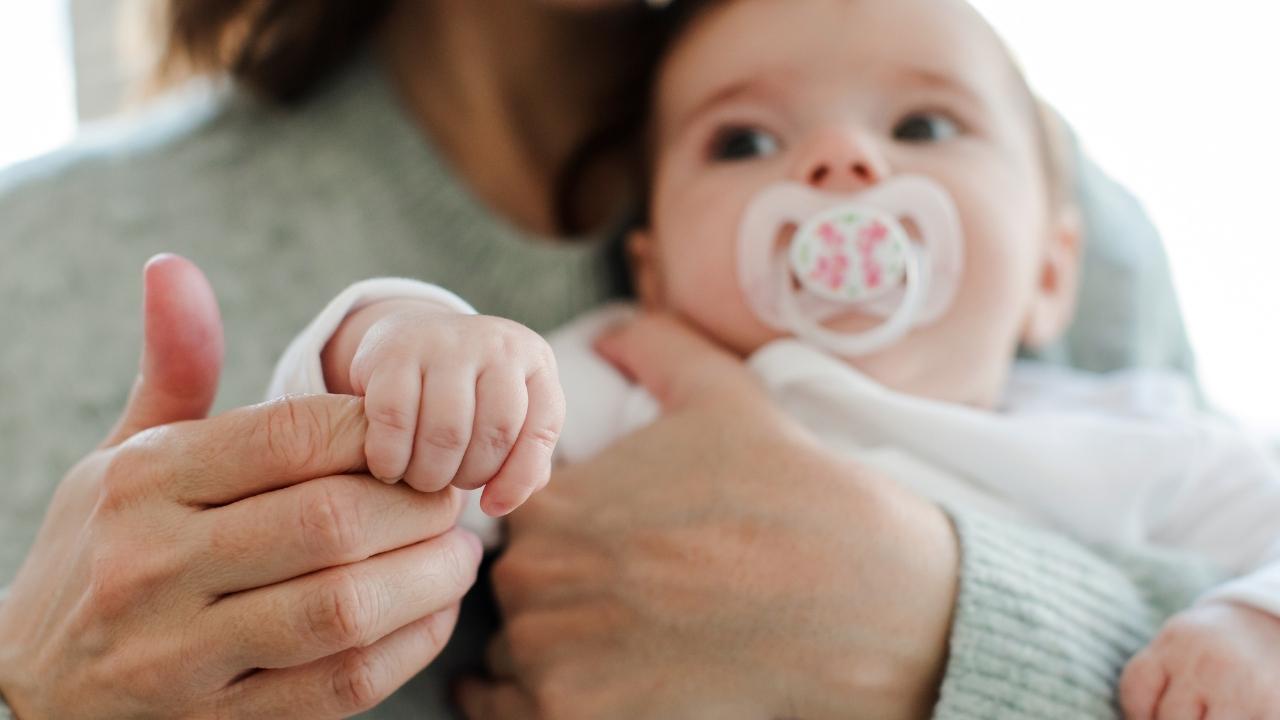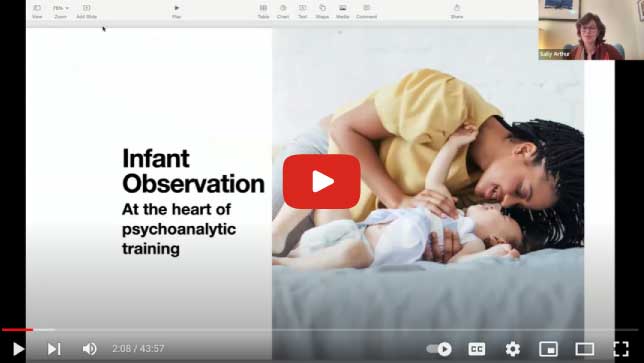
Infant Observation
This two-year course provides an opportunity to develop knowledge and understanding of human development through direct observation of an infant during its early life. The body of knowledge is drawn from the main psychoanalytic schools. The course contains experiential and some theoretical learning.
On satisfactory completion of the Infant Observation Paper participants are awarded a Certificate by the bpf. Those opting not to write will receive a Certificate of Attendance.
We are now accepting applications for Infant Observation.
- Who is it for
- Course content
- Course structure
- Entry requirements
- Course fees
- Resources
- Access information
- How to apply
Anyone who works with people will benefit from undertaking an Infant Observation, especially therapists and counsellors.
For those considering training in psychotherapy or analysis, it is indispensable in helping to develop your ‘analytic attitude’ – the capacity to maintain an objective stance while remaining emotionally open and reflecting on your countertransference responses.
The experience can activate early developmental areas of the psyche, which is why it is such a valuable aspect of training and also why individual Psychoanalytic or Jungian therapy (minimum 1 x weekly) throughout the course is essential for all applicants.
Participants observe a baby from birth until two years of age, paying close attention to how they relate to their carers and environment. Observing an infant fine-tunes your ability to notice intricate and subtle details and recall sequences of interactions. By reflecting on your observations in a small seminar group, you then build up a picture of the unfolding inner world of the infants and their relationships.
The seminars offer a place to ‘feel into’ or empathically imagine the baby’s experience, to be curious and to explore ideas about what might be going on in the baby’s inner world.
The aims of the course are to help you to:
- Develop a keen understanding of the ways in which human beings develop
- Witness the intense psychosomatic experience of the human infant
- Enhance your attunement to non-verbal and pre-verbal communication
- Sharpen all your observational skills
- Deepen your attentiveness and analytic attitude
- Enrich an appreciation of counter-transference experiences
- Enhance clinical practice
The group and the seminar leader will help you to identify a suitable family who are expecting a baby. Participants then visit the infant in their family setting from birth. People observe until the baby’s second birthday. However, if the student is a PPA trainee, they are only required to undertake a one-year observation, although they may choose to extend this until the baby’s second birthday.
In the seminars, each participant presents their observations in turn for confidential group discussion. The discussion is a chance to clarify, amplify and explore ideas about what might be happening at all sorts of levels. It can be especially fascinating to discover more about non-verbal and pre-verbal communication, and early states of mind and to see the difference between the various infants’ personalities and experiences.
While the seminar leader and the group will offer as much support as possible, if a student has not been able to find a family expecting a baby after 3 terms they may be asked to leave the course.
Observations last one hour a week throughout the year allowing for everyone’s holiday commitments, and after each visit, students write up detailed notes of what has been observed. The estimated time commitment for attending the observation, the seminar and writing up notes is half a day a week.
A number of seminar groups run at a variety of times on different days of the week across London, Ely, Brighton and online.
- 10 seminars per term, 3 terms a year. There is a maximum number of 5 participants in each group.
- At the end of the course, participants are encouraged to write an Infant Observation paper. If applying to the bpf adult Jungian or Psychoanalytic Training or the Child and Adolescent Training, it may be considered a component module.
It is possible to join a seminar group at any time depending on space. Participants who write a final paper will be awarded a Certificate by the bpf. Those opting not to write will receive a Certificate of Attendance.
Time & location of the Infant Observation seminars
A number of seminar groups run at a variety of times on different days of the week across London, Ely, Brighton, Readingand online
A member of the Infant Observation Committee will be in touch with you to discuss where spaces are available.
Places in each group are limited to 5 maximum. This means that, on some occasions, successful applicants may need to wait until a place becomes available in a suitable group, or a new group is formed. We will discuss the availability of places and the likely timeframes after acceptance onto the course. We will endeavour to find a suitable place for successful candidates as quickly as is possible.
You will need to apply for Disclosure and Barring Service clearance at the Enhanced level, before joining the course.
The 2025/2026 Course fees are as follows:
| Yr 1 | Yr 2 |
| £1,653 | £1,545 |
On offer of a place, you will be invited to register and pay via debit card through a secured payment page.
The Infant Observation Course is primarily experiential, and we discourage you from reading theory, especially in the early stages of your observation. Theoretical concepts may be helpful when relevant to the individual observations under discussion and will be required when you come to write your final paper. Seminar leaders can be approached for guidance. You may find the following papers helpful as an introduction to the world of infant observation:
Astor, J & Marlow V (1998), Chapter 1 – Fordham’s development of Jung; Infant Observation and Countertransference, in Alister, I. & Hauke, C. (1998) Infancy and Childhood, Research and Therapy in Contemporary Jungian Analysis, Routledge, London
Joyce, A. (2015) Chapter One: The parent-infant relationship and infant mental health in Baradon, T. et al: The Practice of Psychoanalytic Parent-Infant Psychotherapy Claiming the Baby, Routledge, London
Miller, L. et al (1995), Closely Observed Infants, Duckworth
Stern, D. (1977) The First Relationship Infant and Mother Harvard University Press
Attend our Virtual Open Day to watch a presentation about this course.

Blogs
How to become a psychotherapist in the UK – The British Psychotherapy Foundation
My Journey as a Black Trainee in Psychodynamic Psychotherapy – The British Psychotherapy Foundation
How Couples Psychotherapy Can Transform Relationships – The British Psychotherapy Foundation
Why become a psychotherapist? (part I)
Why become a psychotherapist? (part II)
Videos
What’s it like to be a psychotherapist? Psychoanalytic psychotherapist (youtube.com)
What’s it like to be a psychotherapist? Child and Adolescent Psychotherapist (youtube.com)
What’s it like to be a psychotherapist? Jungian Analyst (youtube.com)
The building has limited access – Please call us on 020 8452 9823 to discuss your needs.
Application Fee:
£170 to cover 2 interviews.
To apply for this course, please download and complete the application form supplied and email it to Sandra Pereira at [email protected]. We are unable to consider your application until you have paid the application fee of £170. You can find a link to the payment page in the application form or click here to pay.
Applications are accepted throughout the year. There is high demand for places on this course and for some groups there is a waiting list. A new, in-person group will start in Reading soon
Alternatively, please print it and return it to Sandra Pereira at 37 Mapesbury Road | London | NW2 4HJ
It has been wonderful to have studied at the bpf, it has changed so many perspectives in my life and I truly cherish this rich experience.”
Catia, bpf Student
Simply, it exceeded all my expectations, and sufficiently impressed and enthused me to consider a future career in psychotherapy. On a personal level it has changed me; something that has been accelerated by beginning my own personal analysis. I find myself thinking about non-verbal communications much more as a consequence of having attended the course.”
bpf Student
The ‘course has allowed to dip my toe into the analytic world and provided a broad overview of the analytic landscape. It has enhanced my understanding of psychoanalytic ideas and I’ve particularly benefited from speaking to experienced clinicians. The discussion groups in particular have been useful to clarify my own ideas and get a different perspective from others. Overall, it has helped me to determine if I would like to pursue work in this field.”
bpf Student
We are now accepting applications for membership from current BPC registrants.
Our equivalency pathway for non-BPC registrants to gain membership is currently on hold until September 2025.
New Courses Starting in 2025
Online:
- Psychodynamic and Jungian Theory for Qualified Practitioners (Taught Online)
bpf North:
- Foundation Course (Taught in Newcastle)
- Psychoanalytic & Psychodynamic Psychotherapy Training (Taught in Newcastle & Online)

